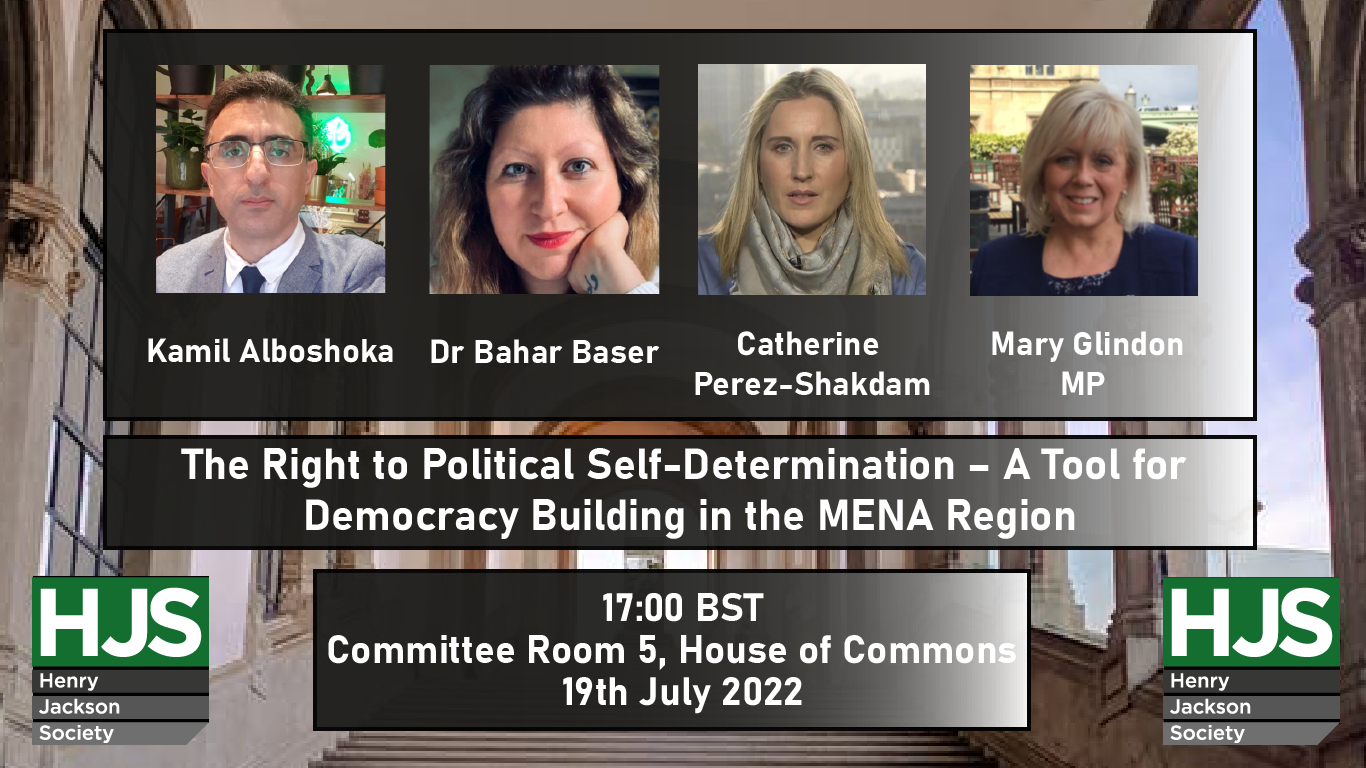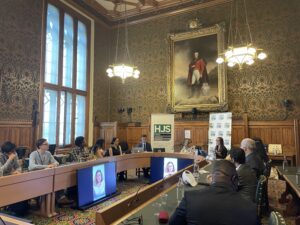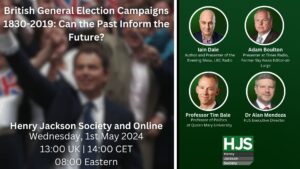The Right to Political Self-Determination: A Kurdish Case Study and Tool for Democracy Building in the MENA Region

- This event has passed.
The Right to Political Self-Determination: A Kurdish Case Study and Tool for Democracy Building in the MENA Region
19th July 2022 @ 5:00 pm - 6:00 pm

The issue of political self-determination: a cardinal principal of international law states that peoples – based on respect for the principle of equal rights and fair equality of opportunity – have the right to freely choose their sovereignty and international political status with no interference.
In recent years, we have moved away from the use of militaries to guarantee stability in those regions of the world most prone to instability – the MENA region being a perfect example. It is therefore necessary to explore new paths, and consider the emancipations of ethnic minorities to promote not only democratic change when confronted with despotism and/or state-run religious fundamentalism, but to also reinvent the concept of statehood as a vehicle for regional stability.
The Kurds, arguably the largest ethnic community in the world without a state of their own remain scattered across Turkey, Iran, Iraq, and Syria, under fear of oppression by their respective host countries. And though the legal foundations first for the emancipation and then for the legal right of self-determination of the Kurds were laid with the Treaty of Sevres in August 1920, such hopes were subsequently dashed.
More recently, the terrible advances of Islamic radicalism in the MENA region makes it imperative to revisit the concept of political self-determination and consider the possibility that aspiring nations not only deserve to see their aspirations met, but that such ambitions could help not only promote stability but help drive off terrorism.
By kind invitation of Mary Glindon MP, The Henry Jackson Society is delighted to invite you to a discussion around political self-determination of the Kurds and other minorities in the Middle East as a driving force for democratic change and the containment of dangerous radical ideologies.

Kamil Albishoka is an experienced researcher and International Law specialist whose main focus areas are human rights, public freedom, criminal justice and security, Kamil holds a Masters in Human Rights from the University of Birkbeck University of London and is currently working as a researcher and project manager at London Centre for International Law Practice.

Dr Bahar Baser joined Durham University’s School of Government and International Affairs in 2021. Previously, she was Associate Professor at the Centre for Trust, Peace and Social Relations, Coventry University where she led the “Peacebuilding and Conflict Transformation Research Group”. Prior to that, she was a postdoctoral research fellow at the University of Warwick at the Department of Politics and International Studies between 2012 and 2014.
Dr Baser completed a PhD in Social and Political Sciences at the European University Institute in Florence, Italy. During her PhD, she had the opportunity to work as a Visiting Research Fellow at Humboldt University (Berlin Graduate School of Social Sciences) in Germany, REMESO (Institute for Research on Migration, Ethnicity and Society) in Norrkoping, Sweden and the Instituto de Ciencias Sociais (ICS) in Lisbon, Portugal.
She is an expert in the area of diaspora studies, peacebuilding and conflict transformation, with a regional focus on the Middle East. She has conducted extensive research on diaspora engagement in peace processes, post-conflict reconstruction and state-building in the Global South. She has published extensively on stateless diaspora activism and mobilisation in Europe with a specific focus on host states’ counterterrorism policies, radicalization of diaspora members and transnationalization of homeland conflicts.
She is the editor of Kurdish Studies Series published by Lexington Books and the co-editor of Diasporas and Transnationalism Series published by Edinburgh University Press. She is also a senior associate research fellow at the Security Institute for Governance and Leadership in Africa (SIGLA), Stellenbosch University, South Africa and visiting professor at Tampere Peace Research Institute, Tampere University, Finland.

Catherine Perez-Shakdam is a French Jewish political analyst and commentator for the Middle East. A former consultant for the United Nations Security Council on Yemen’s War Economy; her research was instrumental in better understanding Yemen’s political landscape and actors’ financial interests.
Her writing and commentaries on the Middle East have graced the cover of countless publications, including the Huffington Post, BBC Arabic, BBC Persia, Voices of America, and the Times of Israel.
In 2017 Catherine was the only Western media personality to have been granted an interview with now-President Ibrahim Raisi.
Her ability to move close to Iran’s Leadership and have access to key information as to the regime’s propagandist structure bought her the ire of Tehran and allegations that she had operated in Iran at the behest of foreign powers.
Once a close friend to Nader Talebzadeh, Catherine had a front row seat to the inner-workings of the Islamic Republic.

Mary Theresa Glindon (born 13 January 1957, Newcastle upon Tyne) is a British Labour Party politician who has been the Member of Parliament (MP) for North Tyneside since 2010.
She was born Mary Theresa Mulgrove. She attended Sacred Heart Grammar School, an RC girls’ direct grant grammar school in Fenham, now known as Sacred Heart Catholic High School, Newcastle upon Tyne.
Mary was selected in February 2010 as Labour candidate for the safe seat, while a Councillor for Battle Hill Ward on North Tyneside Council, after the previous MP Stephen Byers announced in November 2009 that he would not contest the next election.
At the general election in May 2010, she beat Liberal Democrat Councillor David Ord in to a distant second place to hold the seat with 50.7% of the votes, despite an 8.7% swing away from Labour. Glindon is a member of the Labour Friends of Israel and a member of the Labour Friends of Palestine and the Middle East.
As an MP her parliamentary voting record has included opposing the ‘bedroom tax’ and increasing welfare support for those unable to work due to illness or disability. She voted against raising tuition fees to £9000 and against the cut in the Education Maintenance Allowance (EMA) for 16- to 19-year-olds. She has voted for measures to curb climate change and for measures to raise the level of income tax for those earning over £150,000.
In 2013 she was one of 161 MPs to oppose the Marriage (Same Sex Couples) Act 2013, though this was partially due to the fact the act was not ‘equal’ in that members of the public sector same sex couples would not be eligible for the same pension rights, which she stated during the debate. She is also a listed member of the House of Commons’ All-Party Parliamentary Pro-Life Group, opposing abortion.
She was a member of the Environment, Food and Rural Affairs Select Committee, and the Communities and Local Government Select Committee, as of 2010 and 2013, respectively. She was Parliamentary Private Secretary (PPS) to Mary Creagh when she was Shadow Secretary of State for Transport until 2014. Mary was re-elected on 8 May 2015, with 26,191 votes and 55.9% share of the votes cast. Mary has been a member of the Her Majesty’s Opposition Whips Team since April 2020.
Mary married Ray Glindon, also a Councillor, in 2000, however, Ray sadly died in April 2021.
***
EVENT SUMMARY

The Henry Jackson Society was pleased to hold a discussion on political self-determination, focusing on the Kurdish people. Mary Glindon MP began the conversation by introducing the speakers. Catherine Perez-Shakdam discussed the positive impacts that Kurdish self-determination could have on the region. Dr Bahar Baser highlighted the different geopolitical contexts of political self-determination in Iraq and Iran and the controversial role of the PKK in this process. Kamil Alboshoka explained the link between self-determination and international law with, particularly, human rights being a significant factor. Finally, the speakers answered questions on the role of the international community in this process, the impact of the Syrian war on Kurdish self-determination, and the Iranian understanding of peace.
RELATED EVENTS
British General Election Campaigns 1830-2019: Can The Past Inform The Future?”
The British general election is the linchpin of our liberal democracy, and its results are often fundamental to how we live. With the next UK general election looming, there is therefore … Continued



